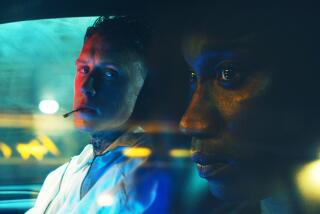Alfie? Naah, he’s Carrie Bradshaw
- Share via
Things have changed since 1966, and Charles Shyer’s remake of “Alfie” reminds us of just how much. The urban morality fable that presented Michael Caine as a predatory Cockney womanizer at the dawn of the Playboy era played like a warning label on the sexual revolution. Compared to the original, the new “Alfie,” which stars an adorably tousled, twinkly eyed Jude Law as a British limo driver in Manhattan, is a bright gumball skittering across a marble floor.
We’re meant to attribute the sequel’s decidedly chirpier, breezier tone to feminism and the all-around social progress of the intervening four decades. But things have changed in the movies since 1966 too, and not just where the portrayal of women is concerned. Somewhere along the line it became mandatory for protagonists to comply with the general guidelines for “the guy test audiences want to have a beer with,” just like presidents.
Consequently, the new “Alfie” isn’t likely to scare anyone monogamous. Not that it really intends to. Alfie’s original karmic comeuppance has been reimagined here as chic, pudding-hearted fashiontainment. Law’s Alfie may be reckless with his girlfriends’ feelings, but he’s better-intentioned, more self-aware and less toxic than Caine was. The remake is a laser-bleached “after” photo gleaming next to Lewis Gilbert’s nicotine-stained “before” -- weaker, maybe, but certainly prettier.
This, admittedly, is not saying much -- the original referred to his girlfriends by the impersonal pronoun, let another man adopt his child rather than commit to the mother and procured a gruesome back-alley abortion for his hospital-mate’s wife, with whom he had sex because he could. It’s also not nearly as interesting, though a smart, sparkly Law does a good job of almost making you forget the limits of the material. Ultimately, what “Alfie” provides is a study in contrasts between movies then and there and movies here and now. In the original, extended, unrepentant bad behavior results in bad consequences for the protagonist. In the remake, it gets the character some life lessons and a personal growth spurt.
Alfie is an international man of penury who has come to New York in search of the American dream -- i.e. more sex with better-looking women and some kind of career advancement. He cheerfully works for a limo service run by the high-strung Wing (Gedde Watanabe, who played Long Duk Dong in “Sixteen Candles” and more or less reprises the role here, only older and more embittered), a petty tyrant who constantly berates his wife. Alfie’s best friend is his co-worker Marlon (Omar Epps), whose girlfriend Lonette (Nia Long), a beautiful bartender, has recently dumped him and whom he desperately wants to win back.
At the start of the movie, Alfie is conducting regular back-of-the-limo trysts with a married woman named Dorie (Jane Krakowski) and a “semi-permanent-quasi-sort-of-girlfriend thing” with Julie (Marisa Tomei), the warmhearted single mother of a cute kid. When Julie discovers Alfie’s most recent infidelity, she decisively dumps him once and for all. She’s so strong and decisive, in fact, that she never looks back, sheds a tear or even returns his stuff with a nasty note. This sort of behavior may be positive role-modeling, but it’s not great drama, or very realistic. Tomei is appealing in early scenes and then all but disappears. When she does pop in she’s given little to do but keep her chin up and her resolve steely. After Julie, Alfie’s girlfriend lineup is the same as it was in the original, though each of the women now appears to have been injected with a similar dose of anabolic self-respect.
So the story floats along in a philosophical swamp of empowerment mythology, theraspeak and materialism-as-personality that’s as contemporary as Oprah’s self-esteem empire. As Alfie moves through a gloriously chic, romanticized Manhattan, we see a series of billboards embossed with words like “dream” and “longing” that, probably inadvertently, end up underscoring the overlap between Alfie’s inner life and advertising. As Julie, Marlon and Lonette recede from his life, Alfie meets Nikki (Sienna Miller), a gorgeous, damaged party girl -- Miller does hot psycho girl like she’s been doing it all her life -- whom he impulsively lets into his life and apartment. Alfie and Nikki spend their blissful first days in bed poring over Vogue and Details, and you can tell it’s a kind of communion.
Likewise, at Chanel with Liz (Susan Sarandon), a sexy self-made millionaire, the camera pans so lovingly over the sign above the door it nearly swoons.
Clearly, Shyer and co-screenwriter Elaine Pope never intended to judge their protagonist very harshly and, when possible, they let him off the hook. (In the original, for instance, Julie’s kid is also Alfie’s. In the remake, he’s just Alfie’s good buddy.) “Alfie” is mostly faithful to the letter of the original, but it compulsively cheats on it in spirit. A transatlantic, postmillennial version of the Michael Caine character would find it easier, not more difficult, to sleep around more and relate less. But instead of a casual dater, they present us with a skittish romantic, a serial monogamist with commitment issues.
To modern eyes, he seems not only fairly commonplace but also awfully familiar. No wonder New York looks like a high-end fashion shoot, with just the right touch of romantic grit and roughness. And no wonder one of the first things the not-so-alpha Alfie does is admit to being a “fashion whore.” Between the modest apartment, the Margiela suits and Prada shoes, the direct-camera address and the love affair with New York, it soon becomes clear that he’s been conceived as nothing more complex or original than a male Carrie Bradshaw (with Liz as his own Ms. Big). Maybe it’s just as well that this postmillennial Alfie is reduced to a shallow boy who grows up and, thanks to many patient teachers, eventually learns something. (A widowed oldster at the urologist’s office even takes him for a what’s-it-all-about walk on the beach.) In a post-feminist, post-AIDS world, the “lady-killer” story has already been told more effectively using actual killing as a metaphor for emotional cruelty and carelessness -- as it was in “American Psycho” or the criminally underseen “Vampire’s Kiss.”
It’s not as if the original “Alfie,” with its thuggishly misogynistic hero, has aged well, anyway. Like “Carnal Knowledge” or Cassavetes’ “Husbands,” it now plays as if it were somehow endorsing the attitudes it criticized.
This isn’t to suggest, though, that the lothario character is not updatable. As it happens, he’s played brilliantly by Thomas Haden Church in another movie out right now, Alexander Payne’s gloriously true “Sideways.” Church’s Jack is a lovable, genial, none-too-bright man-child who goes around life launching wrecking balls of unintentional pain into every situation he encounters. He knows his behavior is bad and he feels bad about it -- which makes him just self-aware enough to be dangerous.
Alfie, by comparison, is just a bush-league lady-gooser who one day gets goosed back.
*
‘Alfie’
MPAA rating: R for sexual content, some language and drug use
Times guidelines: sexual situations, knife-wielding nudity
Jude Law...Alfie
Marisa Tomei...Julie
Omar Epps...Marlon
Nia Long...Lonette
Sienna Miller...Nikki
Paramount presents, a Charles Shyer production. A Charles Shyer film. Executive producers Diana Phillips, Sean Daniel. Produced by Charles Shyer and Elaine Pope. Based on the film “Alfie.” Screenplay by Elaine Pope & Charles Shyer. Based on the play and film “Alfie,” both by Bill Naughton. Director Charles Shyer. Director of photography Ashley Rowe, BSC. Edited by Padraic McKinley. Production designer Sophie Becher. Costume designer Beatrix Aruna Pasztor. Original songs performed by Mick Jagger and Dave Stewart. Music score by Mick Jagger, Dave Stewart and John Powell. Running time: 103 minutes.
In general release.
More to Read
Only good movies
Get the Indie Focus newsletter, Mark Olsen's weekly guide to the world of cinema.
You may occasionally receive promotional content from the Los Angeles Times.










